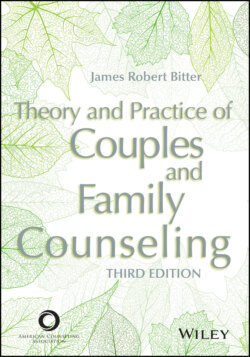Читать книгу Theory and Practice of Couples and Family Counseling - James Robert Bitter - Страница 63
The Couples Counselors
ОглавлениеJohn Mordecai Gottman was born in 1942 in the Dominican Republic to parents who were Orthodox Jews. His father had been a rabbi in Vienna before the family had emigrated just before World War II. The family moved to Brooklyn, New York, when John was still young, and he attended Lubavitch Yeshiva elementary school, a school closely associated with an Orthodox Hasidic movement. John received a doctorate in clinical psychology from the University of Wisconsin as well as master’s degrees in mathematics at the Massachusetts Institute of Technology. John has been married three times. After his first two marriages ended in divorce, he married his partner Dr. Julie Schwartz Gottman; they have been married for more than three decades. John’s most noted work is in the prediction of whether marriages will succeed or fail. His initial descriptions of the “four horsemen”—criticism, defensiveness, stonewalling, and contempt—were later paired with scientific investigations into what led to success in couples and family therapy, studies that support the neuroscience of attachment theory. Although the predictive capacities of their studies have been criticized, the Gottmans are the undisputed, award-winning leaders in bringing evidence-based practices to couples counseling.
Susan M. Johnson was born in England and was literally raised in a pub. She had an early interest in relationships just watching how people in her father’s bar interacted, talking, maneuvering, and connecting. It was her parents’ marriage that most absorbed her life, a marriage that was painful and led to divorce in spite of the fact that her mother and father loved each other until the end of their individual lives. Sue immigrated to Canada and eventually got her doctorate in counseling psychology at the University of British Columbia in Vancouver. With her adviser, Les Greenberg, she developed an early version of what is now called emotionally focused therapy. Her early studies found that staying present with the emotional experiences of couples was more effective than cognitive behavioral interventions and better than the “nothing” that occurred in a control group. Sue’s inspiration was recognizing that the same need a child has for a secure attachment (Bowlby, 1969, 1973, 1981) is also essential to real love in couples.
Harville Hendrix and Helen LaKelly Hunt had been married for a decade and were already internationally known relationship trainers when their marriage degenerated into arguments and discord that brought them to the brink of divorce. Harville Hendrix had appeared on Oprah Winfrey’s show more than a dozen times in support of his best-selling book, Getting the Love You Want (Hendrix & Hunt, 2019). Still, as they will tell you, they did not always practice what they preached. They had developed a number of structured exercises for couples, including their now famous couple dialogues, and in the hopes of saving their marriage they began to use them with each other. These exercises are based on the belief that we all have childhood wounds—breaches in attachment and ways in which a caregiver disappointed us. Furthermore, we tend to search for a marital partner similar to that caregiver and then demand better treatment. To the extent that each partner can come to understand the wounds of the other and stretch into what the partner needs, both people can grow. Such partners can cocreate a safe and secure marriage.
